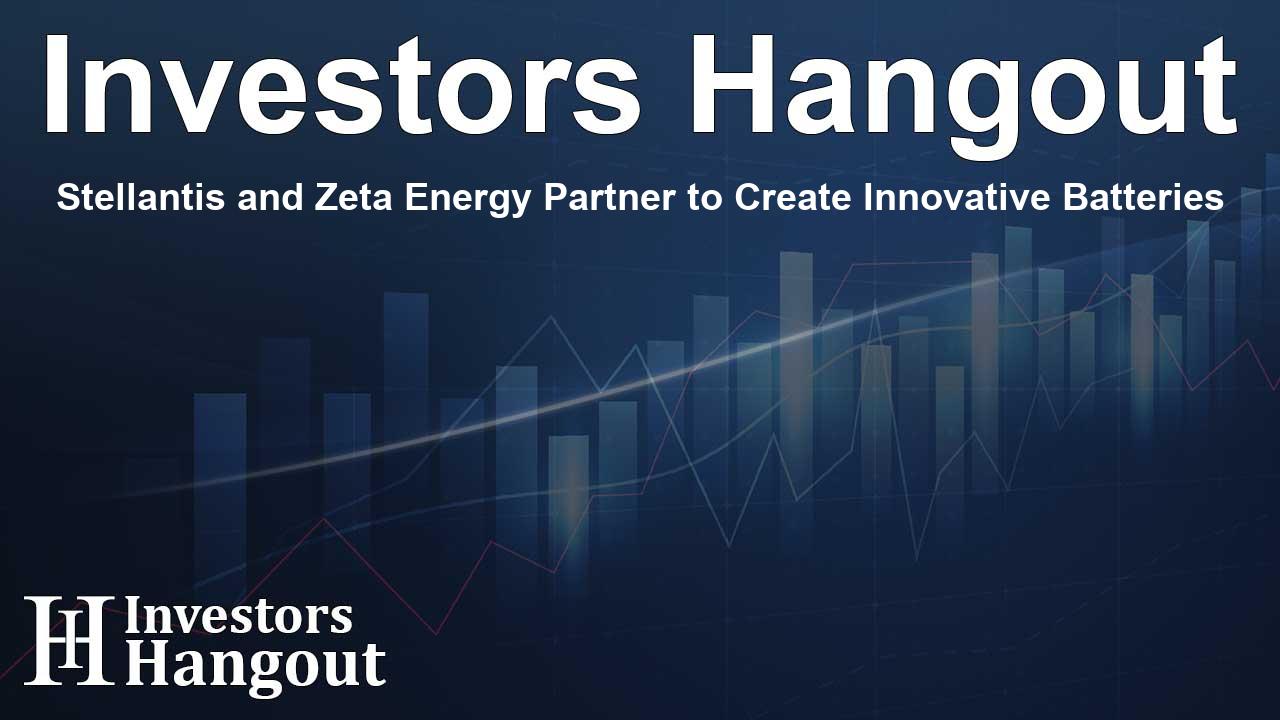Stellantis and Zeta Energy Partner to Create Innovative Batteries

Stellantis and Zeta Energy Forge Partnership for EV Battery Innovation
Stellantis N.V. and Zeta Energy have entered into a groundbreaking agreement focused on enhancing electric vehicle (EV) technology through the development of lithium-sulfur batteries. This initiative aims to create battery packs that are not only significantly lighter but also maintain the same usable energy, ultimately improving the range, handling, and performance of electric vehicles.
Advancements in Battery Technology
The primary objective of this collaboration is to innovate battery technology that can potentially increase fast-charging speeds by up to 50%. This leap in technology will undoubtedly make EV ownership more convenient and attractive to a broader audience. Additionally, the duo expects to lower production costs, with projections indicating their lithium-sulfur batteries could cost less than half the price per kilowatt-hour compared to current lithium-ion alternatives.
Long-Term Goals and Environmental Benefits
The partnership is not just about immediate benefits; the agreement includes plans for pre-production development and strategy formulation for larger-scale production by the year 2030. Once fully deployed, these advanced batteries are anticipated to power a range of Stellantis electric vehicles.
These innovative batteries are being engineered with sustainability in mind. Utilizing waste materials and methane in their production process, the CO2 emissions associated with these batteries will be significantly lower than those from existing technologies. The production is designed to be aligned with gigafactory capabilities, utilizing a completely domestic supply chain either in Europe or North America.
Statements from Company Leadership
Chief Engineering and Technology Officer of Stellantis, Ned Curic, expressed enthusiasm about the collaboration, stating, "Our collaboration with Zeta Energy is another step in helping advance our electrification strategy as we work to deliver clean, safe, and affordable vehicles." He emphasized that such innovative technology is essential for Stellantis' commitment to achieving carbon neutrality by 2038, all while enhancing customer satisfaction with improved performance and affordability.
Complementing this, Tom Pilette, CEO of Zeta Energy, conveyed his excitement about the partnership, noting that their combined expertise and resources could transform the landscape of electric vehicle performance and cost efficiency. This collaboration not only boosts battery innovation but also reinforces the resiliency of the supply chain for EVs.
Integrating Sustainability into Production
The lithium-sulfur battery technology being developed under this partnership is viewed as a key to reducing overall production costs. Zeta Energy’s innovative approach involves using widely available and economical sulfur, which significantly diminishes both the financial burden and supply-chain risks. Moreover, this technology does away with the need for critical minerals such as cobalt, graphite, and nickel, which can be scarce or subject to volatile market conditions.
This initiative aligns with Stellantis' strategic vision, dubbed 'Dare Forward 2030', which aims to rollout over 75 new battery electric vehicle models. Stellantis is exploring diverse chemistry options to cater to the entire customer base, indicative of their forward-thinking approach to electric mobility.
About Stellantis and Zeta Energy
Stellantis N.V. (NYSE: STLA) is a prominent player in the automotive industry dedicated to providing clean, safe, and affordable mobility solutions. With a rich portfolio of iconic and well-loved brands, Stellantis is focused on driving towards a sustainable future by executing ambitious plans aimed at reducing its environmental footprint.
On the other side, Zeta Energy, founded in 2014 and based out of Houston, Texas, specializes in the production of high-performance lithium-sulfur batteries. Their technology has garnered various accolades, positioning them as leaders in the sector striving for innovative, low-cost, and environmentally-friendly solutions.
Frequently Asked Questions
What is the main focus of the Stellantis and Zeta Energy partnership?
The main focus is to develop lithium-sulfur batteries that are lighter, more efficient, and cost-effective for electric vehicles.
How will this battery technology benefit consumers?
This technology will enable greater driving ranges, faster charging times, and improved vehicle performance, making EVs more appealing to customers.
When are these batteries expected to be in production?
The collaboration has plans for pre-production development with anticipated production occurring by 2030.
What are the environmental benefits of these batteries?
These batteries are made using waste materials and methane, reducing CO2 emissions significantly compared to traditional battery technologies.
How does this partnership align with Stellantis' broader strategic goals?
This partnership aligns with Stellantis' 'Dare Forward 2030' strategy, which aims to release a variety of battery electric vehicles and achieve carbon neutrality by 2038.
About The Author
Contact Hannah Lewis privately here. Or send an email with ATTN: Hannah Lewis as the subject to contact@investorshangout.com.
About Investors Hangout
Investors Hangout is a leading online stock forum for financial discussion and learning, offering a wide range of free tools and resources. It draws in traders of all levels, who exchange market knowledge, investigate trading tactics, and keep an eye on industry developments in real time. Featuring financial articles, stock message boards, quotes, charts, company profiles, and live news updates. Through cooperative learning and a wealth of informational resources, it helps users from novices creating their first portfolios to experts honing their techniques. Join Investors Hangout today: https://investorshangout.com/
The content of this article is based on factual, publicly available information and does not represent legal, financial, or investment advice. Investors Hangout does not offer financial advice, and the author is not a licensed financial advisor. Consult a qualified advisor before making any financial or investment decisions based on this article. This article should not be considered advice to purchase, sell, or hold any securities or other investments. If any of the material provided here is inaccurate, please contact us for corrections.
